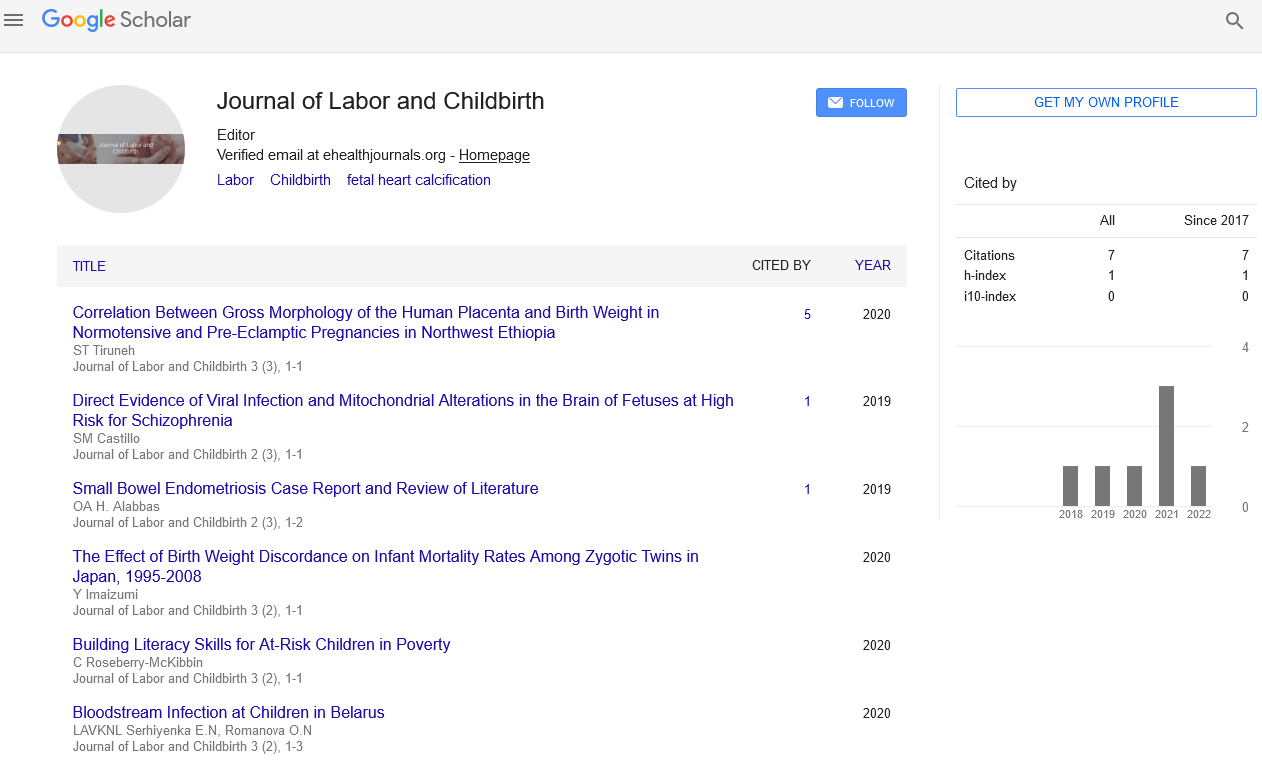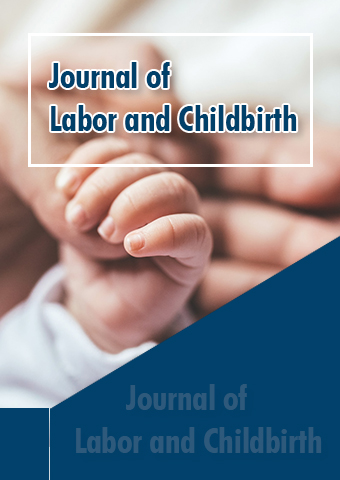Mini Review - Journal of Labor and Childbirth (2022) Volume 5, Issue 6
A brief overview about anxiety disorders: And its Symptoms and Treatment
Andrew Hague*
Department of medical, Charles University, United kingdom
Department of medical, Charles University, United kingdom
E-mail: Andrew.h@gmail.com
Received: 01-Oct -2022, Manuscript No. JLCB-22-79675; Editor assigned: 03-Oct-2022, PreQC No. JLCB-22-79675 (PQ); Reviewed: 17-Oct -2022, QC No. JLCB-22-79675; Revised: 20-Oct -2022, Manuscript No. JLCB-22-79675 (R); Published: 31-Oct -2022, DOI: 10.37532/jlcb.2022.5(8).97-100
Abstract
Anxiety is a normal emotion. It’s your brain’s way of replying to stress and waking you of implicit peril ahead. Everyone feels anxious now and also. For illustration, you may worry when faced with a problem at work, before taking a test, or before making an important decision. Occasional anxiety is OK. But anxiety diseases are different. They’re a group of internal ails that beget constant and inviting anxiety and fear. The inordinate anxiety can make you avoid work, academy, family get- together, and other social situations that might spark or worsen your symptoms.
Introduction
The main symptom of anxiety diseases is inordinate fear or solicitude. Anxiety diseases can also make it hard to breathe, sleep, stay still, and concentrate. Your specific symptoms depend on the type of anxiety complaint you have [1].
Common symptoms are
• Fear, fear, and uneasiness
• Passions of fear, doom, or peril
• Sleep problems
• Not being suitable to stay calm and still
• Cold, sweaty, numb, or chinking hands or bases
• Briefness of breath
• Breathing briskly and more snappily than normal( hyperventilation)
• Heart pulsations
• Sot mouth
• Nausea
• Tense muscles
• Dizziness
• Allowing about a problem over and over again and unfit to stop( reflection)
• Incapability to concentrate
• Intensively or obsessively avoiding stressed objects or places
Still, your croaker will examine you and ask questions about your medical history, If you have symptoms. They may run tests to rule out other health conditions that might be causing your symptoms. No lab tests can specifically diagnose anxiety diseases [2].
Still, they may shoot you to a psychiatrist, psychologist, If your croaker does n’t find any physical reason for how you ’re feeling. Those croakers will ask you questions and use tools and testing to find out if you may have an anxiety complaint [3].
Your croakers will consider how long you’ve had symptoms and how violent they’re when diagnosing you. It’s important to let your croakers or counsellors know if your anxiety makes it hard to enjoy or complete everyday tasks at home, work, or academy [4]. The United States Preventive Service Task Force recommends screening for anxiety in children and adolescents periods 8 to 18 times and webbing for major depressive complaint (MDD) in adolescents periods 12 to 18 times [5].
There are numerous treatments to reduce and manage symptoms of anxiety complaint. generally, people with anxiety complaint take drug and go to comforting [6].
Treatments for anxiety complaint include
Drug. Several types of medicines are used to treat anxiety diseases. Talk to your croaker or psychiatrist about the pros and cons of each drug to decide which bone is stylish for you.
• Antidepressants. Ultramodern antidepressants( SSRIs and SNRIs) are generally the first medicines specified to someone with an anxiety complaint. Exemplifications of SSRIs are escitalopram( Lexapro) and fluoxetine( Prozac). SNRIs include duloxetine ( Cymbalta) and venlafaxine( Effexor) [7].
• Bupropion. This is another type of antidepressant generally used to treat habitual anxiety. It works else than SSRIs and SNRIs.
• Other antidepressants. These include tricyclics and monoamine oxidase impediments (MAOIs). They’re less generally used because side goods, like drops in blood pressure, dry mouth, vague vision, and urinary retention, can be unwelcome or unsafe for some people [8].
• Benzodiazepines. Your croaker may define one of these medicines if you’re having patient panicky passions or anxiety. They help lower anxiety. Exemplifications are alprazolam (Xanax) and clonazepam( Klonopin). They work snappily, but you can come dependent on them. Generally, they’re meant to be an add- on to your anxiety complaint treatment and you should n’t take them for a long time [9,10].
• Beta- blockers. This type of high blood pressure medicine can help you feel more if you ’re having physical symptoms of anxiety, similar as a racing heart, pulsing, or shaking. A beta- blocker may help you relax during an acute anxiety attack [11].
• Anticonvulsants. Used to help seizures in people with epilepsy, these medicines also can relieve certain anxiety complaint symptoms.
• Antipsychotics. Low boluses of these medicines can be added to help make other treatments work more.
• Buspirone (BuSpar). This anti-anxiety medicine is occasionally used to treat habitual anxiety. You’ll need to take it for a many weeks before seeing full symptom relief [12].
Psychotherapy This is a type of comforting that helps you learn how your feelings affect your actions. It’s occasionally called talk remedy. A trained internal health specialist listens and talks to you about your studies and passions and suggests ways to understand and manage them and your anxiety complaint.
Cognitive behavioural remedy (CBT) This common type of psychotherapy teaches you how to turn negative, or fear- causing, studies and actions into positive bones . You ’ll learn ways to precisely approach and manage fearful or worrisome situations without anxiety. Some places offer family CBT sessions [13].
Passing occasional anxiety is a normal part of life. still, people with anxiety diseases constantly have violent, inordinate and patient solicitude and sweat about everyday situations. Frequently, anxiety diseases involve repeated occurrences of unforeseen passions of violent anxiety and fear or terror that reach a peak within twinkles (fear attacks).
These passions of anxiety and fear intrude with diurnal conditioning, are delicate to control, are out of proportion to the factual peril and can last a long time. You may avoid places or situations to help these passions. Symptoms may start during nonage or the teen times and continue into majority.
Exemplifications of anxiety diseases include generalized anxiety complaint, social anxiety complaint( social phobia), specific phobias and separation anxiety complaint. You can have further than one anxiety complaint. occasionally anxiety results from a medical condition that needs treatment.
Several types of anxiety diseases live
• Agoraphobia (ag- uh- ruh- FOE-be-uh) is a type of anxiety complaint in which you sweat and frequently avoid places or situations that might beget you to horrify and make you feel trapped, helpless or embarrassed.
• Anxiety complaint due to a medical condition includes symptoms of violent anxiety or fear that are directly caused by a physical health problem.
• Generalized anxiety complaint includes patient and inordinate anxiety and worry about conditioning or events indeed ordinary, routine issues. The solicitude is out of proportion to the factual circumstance, is delicate to control and affects how you feel physically. It frequently occurs along with other anxiety diseases or depression.
• Fear complaint involves repeated occurrences of unforeseen passions of violent anxiety and fear or terror that reach a peak within twinkles ( fear attacks). You may have passions of brewing doom, briefness of breath, casket pain, or a rapid-fire, fluttering or pounding heart ( heart pulsations). These fear attacks may lead to fussing about them passing again or avoiding situations in which they have passed.
• Picky mutism is a harmonious failure of children to speak in certain situations, similar as academy, indeed when they can speak in other situations, similar as at home with close family members. This can intrude with academy, work and social functioning.
• Separation anxiety complaint is a non-age complaint characterized by anxiety that is inordinate for the child’s experimental position and related to separation from parents or others who have maternal places.
• Social anxiety complaint (social phobia) involves high situations of anxiety, fear and avoidance of social situations due to passions of embarrassment, tone- knowledge and concern about being judged or viewed negatively by others.
• Specific phobias are characterized by major anxiety when you are exposed to a specific object or situation and a desire to avoid it. Phobias provoke fear attacks in some people. • Substance- convinced anxiety complaint is characterized by symptoms of violent anxiety or fear that are a direct result of misusing medicines, taking specifics, being exposed to a poisonous substance or pullout from medicines.
• Other specified anxiety complaint and unidentified anxiety complaint are terms for anxiety or phobias that do not meet the exact criteria for any other anxiety diseases but are significant enough to be distressing and disruptive.
Separation anxiety is frequently allowed of as commodity that only children deal with; still, grown-ups can also be diagnosed with separation anxiety complaint. People who have separation anxiety complaint have fears about being parted from people to whom they’re attached. They frequently worry that some kind of detriment or commodity untoward will be to their attachment numbers while they’re separated. This fear leads them to avoid being separated from their attachment numbers and to avoid being alone. People with separation anxiety may have agonies about being separated from attachment numbers or experience physical symptoms when separation occurs or is anticipated.
Conclusion
Anxiety diseases can frequently go undiagnosed and undressed. Fortunately, treatment can help. The right treatment can help ameliorate your quality of life, connections and productivity. It can also support your overall well- being. You do not need to live with constant solicitude and fear. However, talk to your healthcare provider, If you notice symptoms of an anxiety complaint. It’s stylish to get diagnosed and treated as soon as possible. Doing so can limit the problems that anxiety diseases can beget. Frequently, a combination of specifics and comforting for anxiety can help you feel your stylish.
Acknowledgement
None
Conflict of interest
None
References
- Hovenkamp Hermelink. Predictors of persistence of anxiety disorders across the lifespan: a systematic review. Lancet Psychiatry. 8, 428-443 (2021).
- Keeton CP, Kolos AC, Walkup JT et al. Pediatric generalized anxiety disorder: epidemiology, diagnosis, and management. Paediatric Drugs. 11, 171-183 (2009).
- Shalev Arieh, Liberzon Israel, Marmar Charles et al. Post-Traumatic Stress Disorder. N Engl J Med. 376 (25): 2459-2469 (2017).
- Arehart Treichel Joan. Adult Separation Anxiety Often Overlooked Diagnosis – Arehart-Treichel. Psychiatr News. 41, 30 (2006).
- Shear K, Jin R, Ruscio AM et al. Prevalence and correlates of estimated DSM-IV child and adult separation anxiety disorder in the National Comorbidity Survey Replication. Am J Psychiatry. 163, 1074-1083 (2006).
- Mohatt Justin, Bennett Shannon M, Walkup John T et al. Treatment of Separation, Generalized, and Social Anxiety Disorders in Youths. American Journal of Psychiatry. 171, 741-748 (2014).
- Viana AG, Beidel DC, Rabian B et al. Selective mutism: A review and integration of the last 15 years. Clin Psychol Rev. 29, 57-67 (2009).
- Rose M, Devine J. Assessment of patient-reported symptoms of anxiety. Dialogues Clin Neurosci. 16, 197-211 (2014).
- Samuels MH. Cognitive function in untreated hypothyroidism and hyperthyroidism. Curr Opin Endocrinol Diabetes Obes. 15, 429-433 (2008).
- Grigsby AB, Anderson RJ, Freedland KE et al. Prevalence of anxiety in adults with diabetes: a systematic review. J Psychosom Res. 53 (6): 1053–60 (2002).
- Zingone F, Swift GL, Card TR et al. Psychological morbidity of celiac disease: A review of the literature. United Eur Gastroenterol J. 3: 136-145 (2015).
- Molina Infante J, Santolaria S, Sanders DS et al. Systematic review: noncoeliac gluten sensitivity. Aliment Pharmacol Ther. 41, 807-820 (2015).
- Zhao QF, Tan L, Wang HF et al. The prevalence of neuropsychiatric symptoms in Alzheimer's disease: Systematic review and meta-analysis. J Affect Disord. 190: 264-271 (2016).
Indexed at, Crossref, Google Scholar
Indexed at, Crossref, Google Scholar
Indexed at, Crossref , Google Scholar
Indexed at, Crossref, Google Scholar
Indexed at, Crossref, Google Scholar
Indexed at, Crossref, Google Scholar
Indexed at, Crossref, Google Scholar
Indexed at, Crossref, Google Scholar

